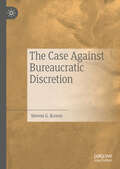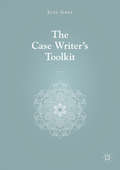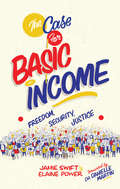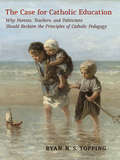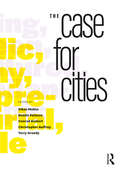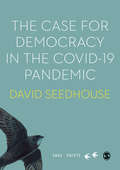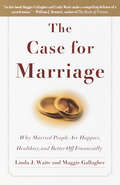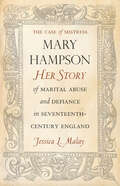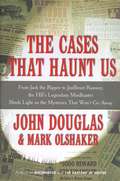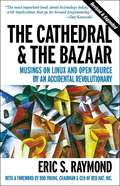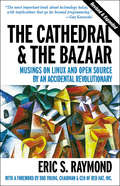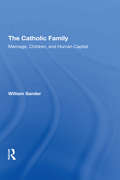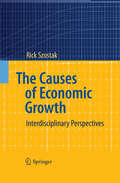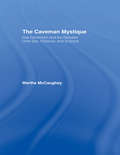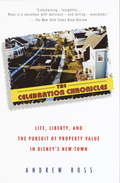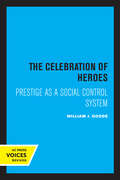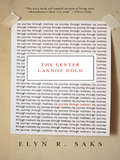- Table View
- List View
The Case Against Bureaucratic Discretion
by Steven G. KovenThis book explores contemporary and historical examples of bureaucratic discretion to describe a continuum of resistance to authoritative directives by hierarchical superiors. Resistance ranges from blind obedience or complete nonresistance to street-level opposition; in between these extremes, however, are minimal compliance and resistance sanctioned by immediate superiors. Although politicians may pass legislation, the subject of bureaucratic implementation or lack thereof remains an area of vital concern. Grounded in administrative theory (beginning with Woodrow Wilson’s seminal discussion of the virtue of adopting a businesslike approach to American governing) and emphasizing the power of street-level bureaucrats, the aim of this book is to expand awareness of the potentially dangerous power of insulated bureaucrats.
The Case Against the Davis-Bacon Act: Fifty-Four Reasons for Repeal
by Armand J. ThieblotThe Davis-Bacon Act is a United States federal law that established the requirement that prevailing wages must be paid on public works projects. In this book, Armand J. Thieblot argues that the law was passed under false pretenses and based on flawed economic logic. Despite this, the law continues to expand in scope and increase in cost. The act is supported by a substantial bureaucracy within the Department of Labor that has resisted all efforts at substantive modernization or reform. Today, the Davis-Bacon Act is the bedrock upon which stands one of the last bastions of private unionization in the construction industry. This book provides a compelling list of fifty-four separate reasons why the Davis-Bacon Act should be repealed.Thieblot deals with the history, purposes, and administrative concepts of prevailing wage laws, providing an overview of the act's administration. He covers the survey and determination process, and delves into how the act is administered. Thieblot summarizes its direct and indirect costs, evaluates counterclaims on the economic impact of Davis-Bacon, and considers compromises short of full repeal. Also included are seven appendices that provide full support for the conclusions summarized in the main text.Thieblot documents a case against Davis-Bacon that is neither judgmental nor political, but he does question whether there is compelling public interest in maintaining a federal prevailing wage law. He puts forward a list of reasons why the Davis-Bacon Act should be repealed, making a convincing case that deserves action and not just simple consideration. This work should be read by all economists, lawmakers, and government officials.
The Case For Make Believe
by Susan LinnIn The Case for Make Believe, Harvard child psychologist Susan Linn tells the alarming story of childhood under siege in a commercialized and technology-saturated world. Although play is essential to human development and children are born with an innate capacity for make believe, Linn argues that, in modern-day America, nurturing creative play is not only countercultural-it threatens corporate profits.A book with immediate relevance for parents and educators alike, The Case for Make Believe helps readers understand how crucial child's play is-and what parents and educators can do to protect it. At the heart of the book are stories of children at home, in school, and at a therapist's office playing about real-life issues from entering kindergarten to a sibling's death, expressing feelings they can't express directly, and making meaning of an often confusing world.In an era when toys come from television and media companies sell videos as brain-builders for babies, Linn lays out the inextricable links between play, creativity, and health, showing us how and why to preserve the space for make believe that children need to lead fulfilling and meaningful lives.
The Case Writer’s Toolkit
by June GweeThis book deconstructs the case study, describes the case writing process and explains how a good case study is composed. It is a reference book that accompanies case writers on their case writing journey. It serves as a guide for writers to develop case studies for teaching, research, and knowledge-capture. There are illustrations and charts to help writers visualise concepts, signpost ideas, break down complex information and apply techniques in a practical manner.
The Case for Basic Income: Freedom, Security, Justice
by Jamie Swift Elaine PowerInequality is up. Decent work is down. Free market fundamentalism has been exposed as a tragic failure. In a job market upended by COVID-19—with Canadians caught in the grip of precarious labour, stagnant wages, a climate crisis, and the steady creep of automation—an ever-louder chorus of voices calls for a liveable and obligation-free basic income. Could a basic income guarantee be the way forward to democratize security and intervene where the market economy and social programs fail? Jamie Swift and Elaine Power scrutinize the politics and the potential behind a radical proposal in a post-pandemic world: that wealth should be built by a society, not individuals. And that we all have an unconditional right to a fair share. In these pages, Swift and Power bring to the forefront the deeply personal stories of Canadians who participated in the 2017–2019 Ontario Basic Income Pilot; examine the essential literature and history behind the movement; and answer basic income’s critics from both the right and left.
The Case for Catholic Education: Why Parents, Teachers, and Politicians Should Reclaim the Principles of Catholic Pedagogy
by Ryan N. S. ToppingCatholic schools have long contributed to the mission of the Church and to the flourishing of society. During the past few decades, however, Catholic schools have suffered severe losses, both in their religious identity and in their capacity to attract students. With penetrating insights, pointed anecdotes, and drawing upon recent empirical studies and Church documents, Ryan Topping describes the near collapse of Catholic education in North America and uncovers the enduring principles of authentic renewal. In The Case for Catholic Education you'll discover: · the three purposes of Catholic education · why virtue is more important than self-esteem · the elements of a true "common core" curriculum · essential differences between "progressive" and "Catholic" models of learning · helpful study questions and a research guide "This is an accessible and eminently readable book on a topic which no Catholic can afford to ignore."--Joseph Pearce, Aquinas College, Nashville, TN "The Case for Catholic Education speaks to the heart of the debate over whether Catholic education is 'worth it.'"--Sister John Mary Fleming, O.P., Executive Director for Catholic Education, USCCB "The Case for Catholic Education will surely play a vital role in reinvigorating the handing-on of essential Catholic truths."--Sister Joseph Andrew Bogdanowicz, O.P., Dominican Sisters of Mary, Mother of the Eucharist, Ann Arbor, MI "This short book contains an astonishing wealth of insights and practical suggestions."--Dr. Keith Cassidy, President of Our Lady Seat of Wisdom Academy "Ryan Topping has written an engaging and coherent analysis of the state of Catholic education in North America, which will be useful for teachers in Britain, too."--Dr. Paul Shrimpton, Magdalen College School, Oxford "An insightful view of our threatened patrimony and a framed vision for what educating and forming our children may still yet become."--Dr. Jason Fugikawa, Dean of Academics and Faculty, Holy Family Academy, Manchester, NH
The Case for Cities
by Danilo Palazzo Vikas Mehta Conrad Kickert Christopher Auffrey Terry GrundyThe fateful year 2020 brought dramatic challenges to American cities. The COVID-19 pandemic and the civil unrest caused by the killing of George Floyd led to a cascade of negative media stories about cities, often politically motivated. It seemed possible that the economic and demographic gains cities had achieved over the last few decades could be lost. In fact, there has been measurable population loss in larger cities caused by changing work/life patterns and changing public perceptions about the costs and benefits of urban living. Faced with these challenges, advocates for cities must make a vigorous case for cities and show how they aren’t the cause of America’s social, environmental, economic, and public health problems but, in fact, are the places where the solutions to those problems will be found. The 38 chapters in The Case for Cities draw on the expertise of contributors from the academic, professional, and civic sectors to explore the creative tension between the two great values on which the vigor of cities depends––that they should be "Cities of Choice" (places where people who have choice want to live) and "Cities of Justice" (places that welcome and support people with limited choices). The book’s underlying perspective is that these two values are symbiotic and that promoting both is what leads to viable, sustainable urban resurgence. This book will be of keen interest to students and practitioners in urban planning, urban design, real estate, architecture, and landscape architecture and to urban advocates and civic leaders.
The Case for Democracy in the COVID-19 Pandemic (SAGE Swifts)
by David SeedhouseOne moment life was normal, the next, governments around the world were imposing radical lockdowns of their populations. But why were decision-makers so readily ignoring centuries of hard-won civil freedoms? Where was the discussion of ethics and human rights? Why were we so easily controlled and why were our controllers so willing to do it? In The Case for Democracy, David Seedhouse explores the psychological biases; distorted risk perceptions; frenetic journalism; the disputed science; the narrow focus of ′experts′; value judgements dressed up as truths; propaganda; the invisibility of ethics; and the alarming irrelevance of inclusive democracy that have been features of governmental responses to the covid-19 pandemic. Seedhouse argues that the chaotic governmental response to Coronavirus, with no attempt to include the public, is the perfect argument for an extensive, participatory democracy; a democracy that demonstrates practical decision making by listening to everyone’s knowledge and expertise. Now is the time for us to solve our problems together.
The Case for Democracy in the COVID-19 Pandemic (SAGE Swifts)
by David SeedhouseOne moment life was normal, the next, governments around the world were imposing radical lockdowns of their populations. But why were decision-makers so readily ignoring centuries of hard-won civil freedoms? Where was the discussion of ethics and human rights? Why were we so easily controlled and why were our controllers so willing to do it? In The Case for Democracy, David Seedhouse explores the psychological biases; distorted risk perceptions; frenetic journalism; the disputed science; the narrow focus of ′experts′; value judgements dressed up as truths; propaganda; the invisibility of ethics; and the alarming irrelevance of inclusive democracy that have been features of governmental responses to the covid-19 pandemic. Seedhouse argues that the chaotic governmental response to Coronavirus, with no attempt to include the public, is the perfect argument for an extensive, participatory democracy; a democracy that demonstrates practical decision making by listening to everyone’s knowledge and expertise. Now is the time for us to solve our problems together.
The Case for God: What Religion Really Means
by Karen ArmstrongThe enormous popularity of books by Richard Dawkins, Christopher Hitchens, Sam Harris and others shows that despite the religious revival that is under way in many parts of the world, there is widespread confusion about the nature of religious truth. For the first time in history, a significantly large number of people want nothing to do with God. In the past people went to great lengths to experience a sacred reality that they called God, Brahman, Nirvana or Dao; indeed religion could be said to be the distinguishing characteristic of homo sapiens. But now militant atheists preach a gospel of godlessness with the zeal of Christian missionaries in the age of faith and find an eager audience. What has happened? Karen Armstrong argues that historically atheism has rarely been a denial of the sacred itself but has nearly always rejected a particular conception of God. During the modern period, the Christians of the West developed a theology that was radically different from that of the pre-modern age. Tracing the history of faith from the Paleolithic Age to the present, Armstrong shows that until recently there was no warfare between science and religion. But science has changed the conversation. The meaning of words such as belief, faith, and mystery has been entirely altered, so that atheists and theists alike now think and speak about God - and, indeed, reason itself - in a way that our ancestors would have found astonishing. Why has the modern God become incredible? Has God a future in this age of aggressive scientific rationalism? Karen Armstrong suggests that if we draw creatively on the insights of the past, we can build a faith that speaks to the needs of our troubled and dangerously polarized world.
The Case for Marriage
by Linda J. Waite Maggie GallagherThe Case for Marriage is a critically important intervention in the national debate about the future of family. Based on the authoritative research of family sociologist Linda J. Waite, journalist Maggie Gallagher, and a number of other scholars, this book’s findings dramatically contradict the anti-marriage myths that have become the common sense of most Americans. Today a broad consensus holds that marriage is a bad deal for women, that divorce is better for children when parents are unhappy, and that marriage is essentially a private choice, not a public institution. Waite and Gallagher flatly contradict these assumptions, arguing instead that by a broad range of indices, marriage is actually better for you than being single or divorced– physically, materially, and spiritually. They contend that married people live longer, have better health, earn more money, accumulate more wealth, feel more fulfillment in their lives, enjoy more satisfying sexual relationships, and have happier and more successful children than those who remain single, cohabit, or get divorced. The Case for Marriage combines clearheaded analysis, penetrating cultural criticism, and practical advice for strengthening the institution of marriage, and provides clear, essential guidelines for reestablishing marriage as the foundation for a healthy and happy society.
The Case for Pragmatic Psychology (Early American Places)
by Daniel FishmanThe best method is the one that works: &“Should be read not only by professional psychologists but by anyone interested in the future of mind-related science.&” —John Horgan, author of The End of Science A cursory survey of the field of psychology reveals raging debate among psychologists about the methods, goals, and significance of the discipline—psychology&’s own version of the science wars. The previous unification of the discipline has given way to a proliferation of competing approaches, a postmodern carnival of theories and methods that calls into question the positivist psychological tradition. Bridging the gap between the traditional and the novel, Daniel B. Fishman proposes an invigorated, hybrid model for the practice of psychology–a radical, pragmatic reinvention of psychology based on databases of rigorous, solution-focused case studies. In The Case for Pragmatic Psychology, Fishman demonstrates how pragmatism returns psychology to a focus on contextualized knowledge about particular individuals, groups, organizations, and communities in specific situations, sensitive to the complexities and ambiguities of the real world. Fishman fleshes out his theory by applying pragmatic psychology to two contemporary psychosocial dilemmas —the controversies surrounding the &“psychotherapy crisis&” generated by the growth of managed care, and the heated culture wars over educational reform. Moving with ease from the theoretical to the nuts and bolts of actual psychological intervention programs, Fishman proffers a strong argument for a new kind of psychology with far-reaching implications for enhancing human services and restructuring public policy.
The Case of Mistress Mary Hampson: Her Story of Marital Abuse and Defiance in Seventeenth-Century England
by Jessica L. MalayThe centerpiece of The Case of Mistress Mary Hampson is the autobiographical narrative of a 17th-century woman in an abusive and violent marriage. Composed at a time when marital disharmony was in vogue with readers and publishers, it stands out from comparable works, usually single broadsheets. In her own words, Mary recounts various dramatic and stressful episodes from her decades-long marriage to Robert Hampson and her strategies for dealing with it. The harrowing tale contains scenes of physical abuse, mob violence, abandonment, flight, and destitution. It also shows moments of personal courage and interventions on the author's behalf by friends and strangers, some of whom are subject to severe reprisals. Mary wrote her story to come to terms with her situation, to justify her actions, and to cast herself in a virtuous light. The accompanying discussion of her life, drawn from other sources, provides chilling evidence of the vulnerability of seventeenth-century women and the flawed legal mechanisms that were supposed to protect them. Readers are also invited to consider in what ways the self-portrait is accurate and what elements of it may be considered fabrication. Malay's archival efforts have thus rescued a compelling and complicated voice from the past.
The Cases That Haunt Us: From Jack the Ripper to Jon Benet Ramsey, The FBI's Legendary Mindhunter Sheds New Light on the Mysteries That Won't Go Away (Lisa Drew Bks.)
by John E. Douglas Mark OlshakerDid Lizzie Borden murder her own father and stepmother? Was Jack the Ripper actually the Duke of Clarence? Who killed JonBenet Ramsey? #1 New York Times bestselling author and legendary FBI criminal profiler John Douglas, along with author and filmmaker Mark Olshaker—the team behind the famous Mindhunter series—explore those tantalizing questions and more in this mesmerizing work of detection.Violent. Provocative. Shocking. Call them what you will…but don't call them open and shut. In The Cases That Haunt Us, Douglas and Olshaker explore the mysteries that both their legions of fans and law enforcement professionals ask about most. With uniquely gripping analysis, the authors reexamine and reinterpret the accepted facts, evidence, and victimology of the most notorious murder cases in the history of crime, including the Lindbergh baby kidnapping, The Zodiac Killer, and the Whitechapel murders. The cases touch a nerve deep within us because of the personalities involved, their senseless depravity, the nagging doubts about whether justice was done, or because, in some instances, no suspect has ever been identified or caught. Taking a fresh and penetrating look at each case, the authors reexamine and reinterpret accepted facts and victimology using modern profiling and the techniques of criminal analysis developed by Douglas within the FBI. The Cases That Haunt Us not only offers convincing and controversial conclusions, it deconstructs the evidence and widely held beliefs surrounding each case and rebuilds them—with fascinating, surprising, and haunting results.
The Category of ‘Religion’ in Contemporary Japan: Shūkyō And Temple Buddhism
by Mitsutoshi HoriiThis book critically examines the term ‘religion’ (shūkyō) as a social category within the sociological context of contemporary Japan. Whereas the nineteenth-century construction of shūkyō has been critically studied by many, the same critical approach has not been extended to the contemporary context of the Japanese-language discourse on shūkyō and Temple Buddhism. This work aims to unveil the norms and imperatives which govern the utilization of the term shūkyō in the specific context of modern day Japan, with a particular focus upon Temple Buddhism. The author draws on a number of popular publications in Japanese, many of which have been written by Buddhist priests. In addition, the book offers rich interview material from conversations with Buddhist priests.Readers will gain insights into the critical deconstruction, the historicization, and the study of social classification system of ‘religion’, in terms of its cross-cultural application to the contemporary Japanese context. The book will be of interest to students and scholars across a range of disciplines including Japanese Studies, Buddhology, Religious Studies, Social Anthropology, and Sociology.
The Cathedral & the Bazaar, Revised Edition
by Eric S. RaymondThe Cathedral & the Bazaar is a must for anyone who cares about the future of the computer industry or the dynamics of the information economy. This revised and expanded paperback edition includes new material on open source developments in 1999 and 2000. Raymond's clear and effective writing style accurately describing the benefits of open source software has been key to its success.
The Cathedral & the Bazaar: Musings on Linux and Open Source by an Accidental Revolutionary
by Eric S. RaymondOpen source provides the competitive advantage in the Internet Age. According to the August Forrester Report, 56 percent of IT managers interviewed at Global 2,500 companies are already using some type of open source software in their infrastructure and another 6 percent will install it in the next two years. This revolutionary model for collaborative software development is being embraced and studied by many of the biggest players in the high-tech industry, from Sun Microsystems to IBM to Intel.The Cathedral & the Bazaar is a must for anyone who cares about the future of the computer industry or the dynamics of the information economy. Already, billions of dollars have been made and lost based on the ideas in this book. Its conclusions will be studied, debated, and implemented for years to come. According to Bob Young, "This is Eric Raymond's great contribution to the success of the open source revolution, to the adoption of Linux-based operating systems, and to the success of open source users and the companies that supply them."The interest in open source software development has grown enormously in the past year. This revised and expanded paperback edition includes new material on open source developments in 1999 and 2000. Raymond's clear and effective writing style accurately describing the benefits of open source software has been key to its success. With major vendors creating acceptance for open source within companies, independent vendors will become the open source story in 2001.
The Catholic Ethic And The Spirit Of Capitalism
by Michael Novak Jana NovakThe Catholic Church has, for generations, been reluctant to come to terms with capitalism. Novak argues that a 100-year debate within the Catholic Church has yielded a richer and more humane vision of capitalism than that described in Weber's Protestant Ethic.
The Catholic Family: Marriage, Children, And Human Capital
by William SanderConsidering the effects of a Catholic heritage on families as a whole and on individuals within families, William Sander looks at the patterns of marriage and intermarriage, divorce, and fertility. He then turns to human capital issues, in-eluding the effects of a Catholic background on academic achievement, earnings, employment, and health habits. Examining the effects of Catholic schooling, Sander takes into account the select nature of the Catholic school population and shows that Catholic high schools have a large negative effect on dropout rates but a positive effect on the test scores of African Americans and Hispanics.
The Causal Power of Social Structures
by Dave Elder-VassThe problem of structure and agency has been the subject of intense debate in the social sciences for over 100 years. This book offers a solution. Using a critical realist version of the theory of emergence, Dave Elder-Vass argues that, instead of ascribing causal significance to an abstract notion of social structure or a monolithic concept of society, we must recognise that it is specific groups of people that have social structural power. Some of these groups are entities with emergent causal powers, distinct from those of human individuals. Yet these powers also depend on the contributions of human individuals, and this book examines the mechanisms through which interactions between human individuals generate the causal powers of some types of social structures. The Causal Power of Social Structures makes particularly important contributions to the theory of human agency and to our understanding of normative institutions.
The Causes of Economic Growth
by Rick SzostakWhat are the causes of economic growth? As billions of people still live in poverty, this is perhaps the most important question in human science. It is also a very complex one, as rates of economic growth are influenced by a multitude of economic as well as political, geographical and sociological factors. This books attempts to advance a nuanced understanding of the process of economic growth by synthesizing the insights of several social science disciplines. Different theories and methods employed by economists and other social scientists to study the causes of economic growth are analyzed and it is shown how and why those insights should be integrated by applying best-practice techniques of interdisciplinary analysis. Scholars and practitioners are thus provided with a wide array of potential strategies for encouraging growth as well as guidance on how these strategies may interact.
The Caveman Mystique: Pop-Darwinism and the Debates Over Sex, Violence, and Science
by Martha McCaugheyHas evolution made men promiscuous skirt chasers? Pop-Darwinian claims about men's irrepressible heterosexuality have become increasingly common, and increasingly common excuses for men's sexual aggression. The Caveman Mystique traces such claims about the hairier sex through evolutionary science and popular culture. After outlining the social and historical context of the rise of pop-Darwinism's assertions about male sexuality and their appeal to many men, Martha McCaughey shows how evolutionary discourse can get lived out as the biological truth of male sexuality. Although evolutionary scientists want to use their theories to solve social problems, evolutionary narratives get invoked by men looking for a Darwinian defense of bad-boy behaviors. McCaughey argues that evolution has nearly replaced religion as a moral guide for understanding who we are and what we must overcome to be good people. Bringing together insights from the fields of science studies, body studies, feminist theory and queer theory, The Caveman Mystique offers a fresh understanding of science, science popularization, and the impact of science on men's identities making a convincing case for deconstructing, rather than defending, the caveman.
The Celebration Chronicles
by Andrew RossScholar and iconoclast Andrew Ross spent a year living in the much scrutinized, and often demonized, Celebration--the picture-perfect town that Disney is building for 20,000 people in the swamp and scrub of central Florida. Lavishly planned with a downtown center and newly minted antique homes, and front-loaded with an ultraprogressive school, hospital, and high-tech infrastructure, Celebration was to offer a fresh start in a world gone wrong. Yet behind the picket fences, gleaming facades, and "Kodak moment" streetscapes, Ross discovered a real place with real problems, and not a theme park village cooked up by the Imagineers. Compelling and wide-ranging in its analysis, The Celebration Chronicles provides a startlingly fresh perspective on the link between contemporary urban planning and corporate bottom lines.From the Trade Paperback edition.
The Celebration of Heroes: Prestige as a Social Control System
by William J. GoodeThis title is part of UC Press's Voices Revived program, which commemorates University of California Press’s mission to seek out and cultivate the brightest minds and give them voice, reach, and impact. Drawing on a backlist dating to 1893, Voices Revived makes high-quality, peer-reviewed scholarship accessible once again using print-on-demand technology. This title was originally published in 1978.
The Center Cannot Hold: My Journey Through Madness
by Elyn R. SaksElyn Saks is a success by any measure: she's an endowed professor at the prestigious University of Southern California Gould School of Law. She has managed to achieve this in spite of being diagnosed as schizophrenic and given a "grave" prognosis--and suffering the effects of her illness throughout her life.Saks was only eight, and living an otherwise idyllic childhood in sunny 1960s Miami, when her first symptoms appeared in the form of obsessions and night terrors. But it was not until she reached Oxford University as a Marshall Scholar that her first full-blown episode, complete with voices in her head and terrifying suicidal fantasies, forced her into a psychiatric hospital.Saks would later attend Yale Law School where one night, during her first term, she had a breakdown that left her singing on the roof of the law school library at midnight. She was taken to the emergency room, force-fed antipsychotic medication, and tied hand-and-foot to the cold metal of a hospital bed. She spent the next five months in a psychiatric ward.So began Saks's long war with her own internal demons and the equally powerful forces of stigma. Today she is a chaired professor of law who researches and writes about the rights of the mentally ill. She is married to a wonderful man.In The Center Cannot Hold, Elyn Saks discusses frankly and movingly the paranoia, the inability to tell imaginary fears from real ones, and the voices in her head insisting she do terrible things, as well as the many obstacles she overcame to become the woman she is today. It is destined to become a classic in the genre.
